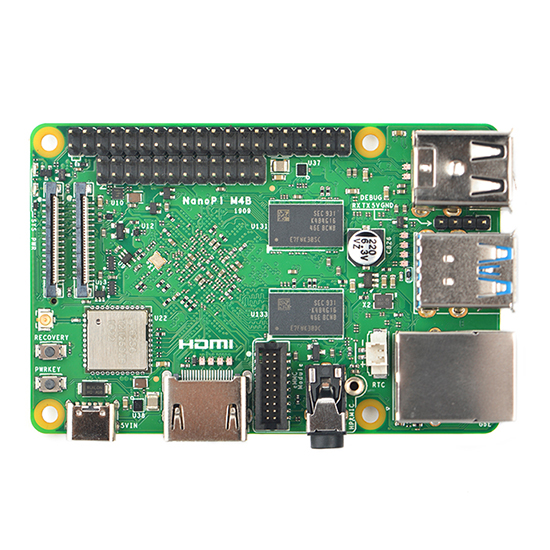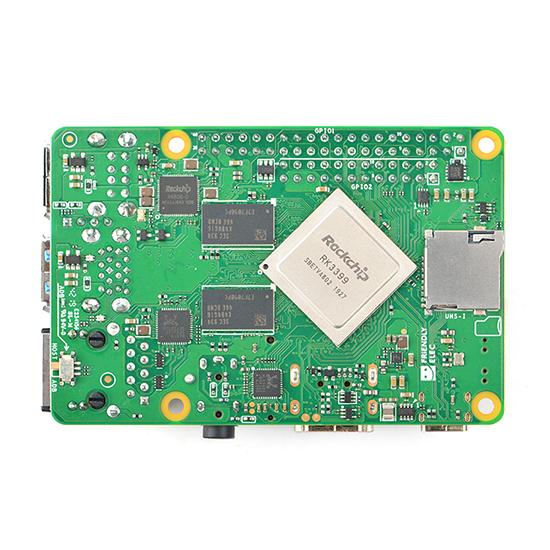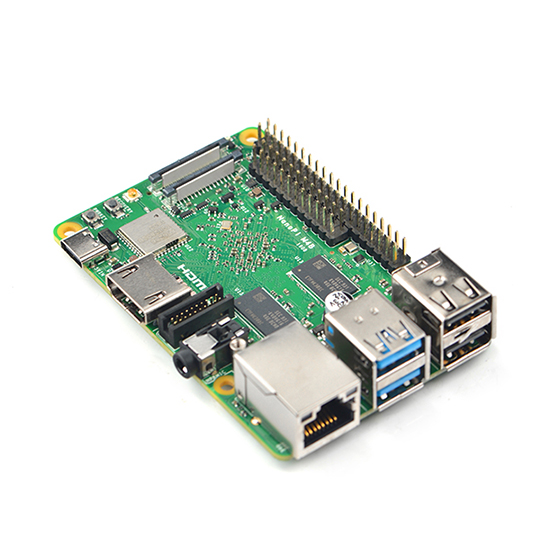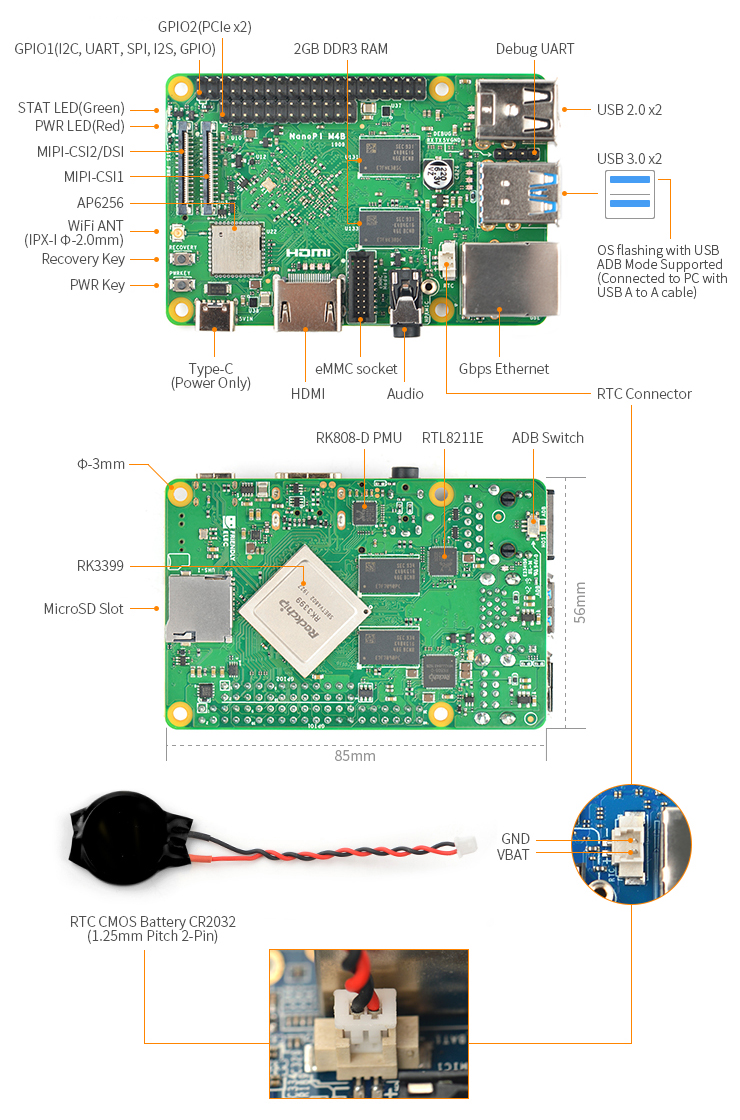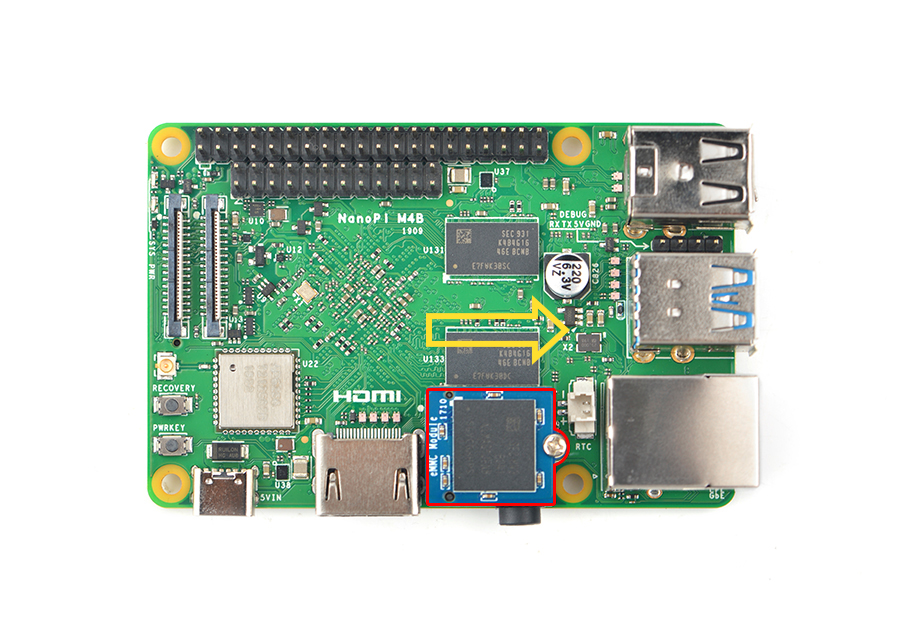Difference between revisions of "NanoPi M4B"
From FriendlyELEC WiKi
(→Board Dimension) |
(→Diagram, Layout and Dimension) |
||
| Line 44: | Line 44: | ||
===Layout=== | ===Layout=== | ||
[[File:NanoPi_M4B_Layout.jpg |thumb|600px|NanoPi M4B Layout]] | [[File:NanoPi_M4B_Layout.jpg |thumb|600px|NanoPi M4B Layout]] | ||
| + | [[File:NanoPi_M4B_eMMC.jpg |thumb|600px|NanoPi M4B eMMC]] | ||
* '''40-Pin GPIO1 Pin Spec''' | * '''40-Pin GPIO1 Pin Spec''' | ||
::{| class="wikitable" | ::{| class="wikitable" | ||
Revision as of 06:54, 26 November 2019
Contents
1 Introduction
- The NanoPi M4B is a RK3399 SoC based ARM board. It has the same form of factor as the RPi B3+ and has ports and interfaces compatible with RPi B3+ too. On a 85 x 56 mm compact board there are rich hardware resources. These features make it a good platform for rapid product prototyping and various applications.
- The NanoPi M4B has an onboard 2.4G & 5G dual-band WiFi + Bluetooth 5.0 combo wireless module, two USB3.0 host, two USB2.0 Host, one Gbps Ethernet port, one HDMI 2.0 Type A port, one 3.5mm audio jack and one Type-C for Power Supply. In addition it has a RPi compatible 40-pin connector, dual MIPI-CSI camera interface, PCIe x2, eMMC socket, RTC port and etc.
- The NanoPi M4B supports Ubuntu Desktop 18.04(64-bit), Lubuntu 16.04(32-bit), Ubuntu Core 18.04(64-bit), Android 8 and Lubuntu Desktop with GPU and VPU acceleration. With these rich resources and powerful performance it can be widely used in applications of machine learning, AI, deep learning, robots, industrial control, industrial cameras, advertisement machines, game machines, blockchain and etc.
2 Hardware Spec
- SoC: Rockchip RK3399
- CPU: big.LITTLE,Dual-Core Cortex-A72(up to 2.0GHz) + Quad-Core Cortex-A53(up to 1.5GHz)
- GPU: Mali-T864 GPU,supports OpenGL ES1.1/2.0/3.0/3.1, OpenCL, DX11, and AFBC
- VPU: 4K VP9 and 4K 10bits H265/H264 60fps decoding, Dual VOP, etc
- PMU: RK808-D PMIC, cooperated with independent DC/DC, enabling DVFS, software power-down, RTC wake-up, system sleep mode
- RAM: Dual-Channel 2GB DDR3
- Flash: no Onboard eMMC, but has a eMMC socket
- Ethernet: Native Gigabit Ethernet
- Wi-Fi/BT: 802.11a/b/g/n/ac, Bluetooth 5.0, Wi-Fi and Bluetooth combo module
- Video Input: one or two 4-Lane MIPI-CSI, dual ISP, up to 13MPix/s,supports simultaneous input of dual camera data
- Video output
- HDMI: HDMI 2.0a, supports 4K@60Hz,HDCP 1.4/2.2
- one 4-Lane MIPI-DSI
- Audio Out: 3.5mm Dual channel headphone jack, or HDMI
- Audio In: one microphone input interface
- USB Host : two Native USB 3.0 Type-A ports, two Native USB 2.0 Type-A ports
- microSD Slot x 1
- 40Pin GPIO Extension ports:
- 3 X 3V/1.8V I2C, up to 1 x 3V UART, 1 X 3V SPI, 1 x SPDIF_TX, up to 8 x 3V GPIOs
- 1 x 1.8V 8 channels I2S
- 24Pin Extension ports:
- PCIe x2
- PWM x1, PowerKey, IR_RX
- Buttons:one PowerKey, one Recovery Key
- Debug: one Debug UART, 4 Pin 2.54mm header, 3V level, 1500000bps
- LED: 1 x power LED and 1 x GPIO Controlled LED
- RTC Battery: 2 Pin 1.27/1.25mm RTC battery input connector
- Power supply: DC 5V/3A via Type-C or GPIO header
- PCB: 8 Layer, 85 mm x 56 mm
- Ambient Operating Temperature: -20℃ to 70℃
3 Diagram, Layout and Dimension
3.1 Layout
- 40-Pin GPIO1 Pin Spec
Pin# Assignment Pin# Assignment 1 VCC3V3_SYS 2 VDD_5V 3 I2C2_SDA(3V) 4 VDD_5V 5 I2C2_SCL(3V) 6 GND 7 GPIO1_A0(3V) 8 GPIO4_C1/I2C3_SCL(3V) 9 GND 10 GPIO4_C0/I2C3_SDA(3V) 11 GPIO1_A1(3V) 12 GPIO1_C2(3V) 13 GPIO1_A3(3V) 14 GND 15 GPIO1_A4(3V) 16 GPIO1_C6(3V) 17 VCC3V3_SYS 18 GPIO1_C7(3V) 19 SPI1_TXD/UART4_TX(3V) 20 GND 21 SPI1_RXD/UART4_RX(3V) 22 GPIO1_D0(3V) 23 SPI1_CLK(3V) 24 SPI1_CSn0(3V) 25 GND 26 GPIO4_C5/SPDIF_TX(3V) 27 I2C2_SDA(1.8V) 28 I2C2_SCL(1.8V) 29 I2S0_LRCK_RX(1.8V) 30 GND 31 I2S0_LRCK_TX(1.8V) 32 I2S_CLK(1.8V) 33 I2S0_SCLK(1.8V) 34 GND 35 I2S0_SDI0(1.8V) 36 I2S0_SDO0(1.8V) 37 I2S0_SDI1SDO3(1.8V) 38 I2S0_SDI2SDO2(1.8V) 39 GND 40 I2S0_SDI3SDO1(1.8V)
- 24-Pin GPIO2 Pin Spec
Pin# Assignment Pin# Assignment 1 VCC5V0_SYS 2 VCC5V0_SYS 3 PCIE_RX1_P 4 PCIE_TX1P 5 PCIE_RX1_N 6 PCIE_TX1N 7 GND 8 GND 9 PCIE_RX0_P 10 PCIE_TX0P 11 PCIE_RX0_N 12 PCIE_TX0N 13 GND 14 GND 15 PCIE_REF_CLKP 16 17 PCIE_REF_CLKN 18 19 GND 20 GND 21 PWR_KEY 22 23 GPIO4_C6/PWM1(3V) 24 IR_RX
- MIPI-CSI Interface Pin Spec
- 0.5mm FPC Connector
- MIPI-CSI2 can be configured to MIPI-DSI
Pin# MIPI-CSI1 MIPI-CSI2 Description 1 VCC5V0_SYS VCC5V0_SYS 5V Power ouput 2 VCC5V0_SYS VCC5V0_SYS 5V Power ouput 3 GND GND Return current path 4 VCC_CSI_AF2.8V VCC_CSI_AF2.8V 2.8V Power for VCM 5 VCC_CSI_1.2V VCC_CSI_1.2V 1.2V Power for image sensor core circuit 6 VCC1V8_CAM VCC1V8_CAM 1.8V power for I/O circuit 7 VCC_CSI_2.8V VCC_CSI_2.8V 2.8V power for image sensor analog circuit 8 VCC_CSI_1.0V VCC_CSI_1.0V 1.0V Power for image sensor core circuit 9 I2C1_SCL I2C2_SCL 1.8V I2C clock signal 10 I2C1_SDA I2C2_SDA 1.8V I2C data signal 11 MIPI_CSI0_RST MIPI_CSI1_RST reset camera module 12 MIPI_CSI0_PWN MIPI_CSI1_PWN Power down camera module 13 GND GND Return current path 14 GPIO2_B3_CIF_CLKOUTA GPIO2_B3_CIF_CLKOUTA MCLK to camera module 15 GND GND Return current path 16 MIPI_RX0_D3P MIPI_TX1/RX1_D3P MIPI CSI positive differential data line transceiver output 17 MIPI_RX0_D3N MIPI_TX1/RX1_D3N MIPI CSI negative differential data line transceiver output 18 GND GND Return current path 19 MIPI_RX0_D2P MIPI_TX1/RX1_D2P MIPI CSI positive differential data line transceiver output 20 MIPI_RX0_D2N MIPI_TX1/RX1_D2N MIPI CSI negative differential data line transceiver output 21 GND GND Return current path 22 MIPI_RX0_D1P MIPI_TX1/RX1_D1P MIPI CSI positive differential data line transceiver output 23 MIPI_RX0_D1N MIPI_TX1/RX1_D1N MIPI CSI negative differential data line transceiver output 24 GND GND Return current path 25 MIPI_RX0_CLKP MIPI_TX1/RX1_CLKP MIPI CSI positive differential clock line transceiver output 26 MIPI_RX0_CLKN MIPI_TX1/RX1_CLKN MIPI CSI negative differential clock line transceiver output 27 GND GND Return current path 28 MIPI_RX0_D0P MIPI_TX1/RX1_D0P MIPI CSI positive differential data line transceiver output 29 MIPI_RX0_D0N MIPI_TX1/RX1_D0N MIPI CSI negative differential data line transceiver output 30 GND GND Return current path
- eMMC Socket Pin Spec
Pin# Assignment Pin# Assignment 1 EMMC_D0 2 EMMC_D1 3 EMMC_D2 4 EMMC_D3 5 EMMC_D4 6 EMMC_D5 7 EMMC_D6 8 EMMC_D7 9 EMMC_STRB 10 GND 11 EMMC_CMD 12 EMMC_CLKO 13 N/C 14 GND 15 N/C 16 VCC1V8_S3 17 eMMC_RST 18 VCC3V3_S3 19 GND 20 GND
- Debug UART Pin Spec
- 3V level signals, 1500000bps
Pin# Assignment Description 1 GND 0V 2 VCC5V0_SYS 5V power output 3 UART2DBG_TX output 4 UART2DBG_RX intput
- USB Port
- Each USB3.0 port can output 2A current
- Two USB2.0 port share 2A current
- RTC
- RTC backup current is 27uA.
- Connector P/N: Molex 53398-0271
- Notes
- Power Input : 5V/3A, via USB Type-C(USB PD Specification is not supported) or Pin2&Pin4 of the 40-pin GPIO1 header
- For more details refer to the Schematic: NanoPi-M4B-1909-Schematic.pdf
3.2 Board Dimension
- For more details refer to the CAD document: NanoPi_M4B_1909_dxf.zip
